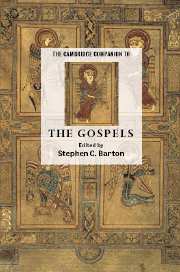Introduction
Published online by Cambridge University Press: 28 January 2007
Summary
There can be no doubt that the four gospels of the Christian Bible are of fundamental significance for Christian life and thought. The gospel stories about Jesus' birth, life, death and resurrection, about his teaching, miracle working and care for the poor, are read and recounted in churches throughout the world every Sunday. They shape Christian worship and sacramental practice, inspire Christian art, architecture and aesthetics, and inform Christian morality at both the individual and social levels. It could even be said that Christian life in all its aspects is an ongoing 'performance' of the gospels. And, of course, to the extent that the Christian community is a part of the wider human community, the performance of the gospels contributes to the shaping of the moral, spiritual and aesthetic traditions of people worldwide whether Christian or not. It is fitting, therefore, that the Cambridge Companion series should include a Companion to the Gospels. Of course, there are many fine introductions to the gospels, the New Testament, and the Bible as a whole, already available. Most of these are written with a view to explaining the meaning and significance of the texts by means of the best tools of historical understanding currently available. They address, for example, questions about authorship and dating, about the historical context of the work, its author and audience, about the formation and transmission of the text in its various versions, and, more recently, questions about the history of the reception of the text.
- Type
- Chapter
- Information
- The Cambridge Companion to the Gospels , pp. 1 - 10Publisher: Cambridge University PressPrint publication year: 2006



